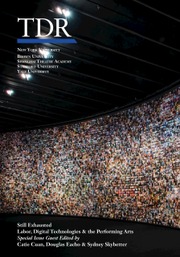In spring 2023, I collaborated on a blog post, “Marco Goecke’s Shitstorm,” for Cambridge University Press and TDR to promote the special issue on contemporary German theatre I had coedited with Matt Cornish. It was culled from an email dialogue I had with Matt and contributors Andrew Friedman and Kevin Clarke about choreographer Marco Goecke’s February 2023 attack on a prominent dance critic, Wiebke Hüster, using dog feces as his weapon. You will find the post not on CUP’s official TDR website but on Facebook at www.facebook.com/TDR.TheDramaReview/posts/587855093333472.
Why?
By mid-June I was puzzled that the post had not yet appeared but chalked it up to a bureaucratic glitch. Richard Schechner then informed me that CUP had nixed the post, sending him a vague statement about its tone and relevance to the special issue.
This incident only reinforces my sense of the incommensurability between Anglophone and German theatre. And when I say “theatre,” I include the powerful and widely dispersed critical apparatus that supports it throughout the German-speaking world.
CUP’s choice betrays irreducible differences—theatre in Germany is simply a different beast from what it is in New York or London. In Germany, it is central to how culture defines itself; outside of politics, it is the most important forum for discussion and debate about a host of political, social, and aesthetic issues. The stakes are so high in the Goecke/Hüster case because it represents a shocking and violent intensification of German theatre’s propensity to interrogate its own operation and test its presumed limits.
Goecke chose his target carefully: the dance critic for a leading, center-right newspaper headquartered in Frankfurt, a city which, not coincidentally, is home to both the German and European Central Banks. I’d compare the Frankfurter Allgemeine Zeitung to a combination of the New York Times and the Wall Street Journal were it not for the fact that the completely different German and US media landscapes make a direct comparison impossible.
CUP’s refusal to publish is for me also a sign that the press in Germany is far livelier (and simply more alive!) than the press in the US. I count seven major daily national newspapers in Germany that cover theatre and dance, as well as weekly national newspapers and magazines, regional newspapers, national and regional radio, television shows, and the two widely available monthly magazines devoted to theatre, Theater der Zeit and Theater heute, plus the dedicated website Nachtkritik. In the weeks after the Goecke incident, critics, artists, and theatre administrators issued statements and opinion pieces that quickly devolved into a passionate and sometimes acrimonious debate about the function of criticism itself.
I should also note that we chose “shitstorm”—perhaps a tonal failure for CUP—partly because in 2018, then-Chancellor Angela Merkel used the word (in English) in a conference presentation that sparked quite a bit of perplexed coverage in the US press (see www.nytimes.com/2018/12/05/world/europe/merkel-storm-translation-germany.html).
CUP’s censorship inadvertently supports the argument I made in a talk I gave just days before Richard notified me of the press’s decision: “I have become more and more convinced of the wrongheadedness of the claim that theatre represents a universal language. The more intimately I have gotten to know German theatre, the trickier it has become to explain to my New York friends.” I never expected to have that claim borne out so quickly, forcefully, and persuasively.


